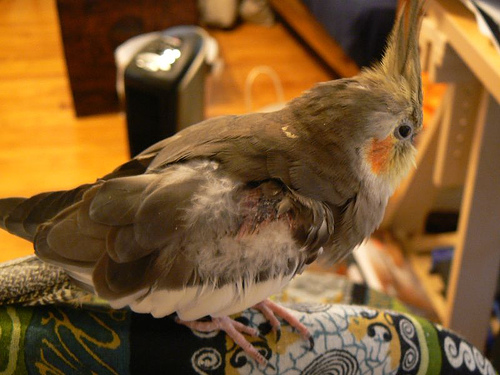
“Feather plucking” can be one of the most frustrating problems to deal with in your pet bird. Feather plucking occurs when a bird pulls out or damages its own feathers. Common areas of feather loss are the chest, abdomen, upper legs, and the inside of the wings.
A bird that has missing or damaged feathers often has another underlying problem that is the cause of it. Identifying this underlying cause is often a lengthy process of elimination, and requires a great deal of patience.
Has my bird lost its feathers because it has some disease?
This may be the case with some birds. There are numerous illnesses that can result in feather damage and/or loss:
• Poor nutrition (results in poor quality feathers)
• Poor husbandry (e.g. bad cage design)
• Hypothyroidism (deficiency in thyroid hormone)
• Bacterial or fungal folliculitis
• Liver disease
• Air sacculitis
• External parasites (e.g. feather mites, lice)
• Internal parasites (e.g. roundworms, tapeworms)
• Lead poisoning
• Viral infection (e.g. polyoma virus, psittacine beak and feather disease)
The above list is quite extensive, which is why your pet should undergo a thorough diagnostic work-up by a veterinarian. However, if the problem is not medical, than it is probably psychological, which can be much more difficult to deal with. Boredom, stress, and sexual frustration are frequently implicated as the source of a pet’s bad behaviour.
Why do I need to take my bird to the vet if the problem is purely cosmetic?
There are a number of reasons to justify a visit to the veterinarian. First, if there is an underlying medical disorder, it is imperative that that be treated. Plus, feather picking can progress to other health problems: anorexia, weight loss, and bacterial infection of the feather follicles. Lastly, resolving any psychological problems that your bird has will lead to it living a longer, healthier and happier life.
How can I prevent my bird from doing further damage to itself?
Any underlying medical problems should be dealt with first. In cases of neurosis, the source of the neurosis must be corrected in order for treatment to be successful. Treating a feather-plucking bird requires a great amount of time and commitment from the owner.
Here are a few suggestions for improving conditions for your pet:
• Change the birds environment frequently (rotate toys weekly)
• Buy a larger cage
• Provide the bird with regular opportunities for exercise
• Give branches to gnaw
• Bathe/spray daily (especially African Grey parrots)
• Stick to a regular 12 hour light:12 hour dark cycle
• Increase the amount of time you spend with your bird (or purchase a companion for your bird)
• Provide a hide so your bird has privacy or move the cage to a more private location
• Leave a radio or television on when you are not at home – the consistent background noise is comforting to some birds
• Improve nutrition to the level appropriate for feather regrowth (e.g. increase energy, calcium, protein, and vitamin A)
If these measures do not improve matters, some last resort options can be considered:
• Elizabethan collar: prevents the bird’s access to its feathers. The collar should be removed when normal feathers have regrown (should not be considered a permanent solution!)
• Tranquilizers: your veterinarian may prescribe diazepam (Valium) to be put in the drinking water
Remember these last measures should only be considered for birds that are seriously mutilating themselves. Always consult a qualified avian veterinarian before deciding on the use of a collar or tranquilizers.
(photo: zandperl)